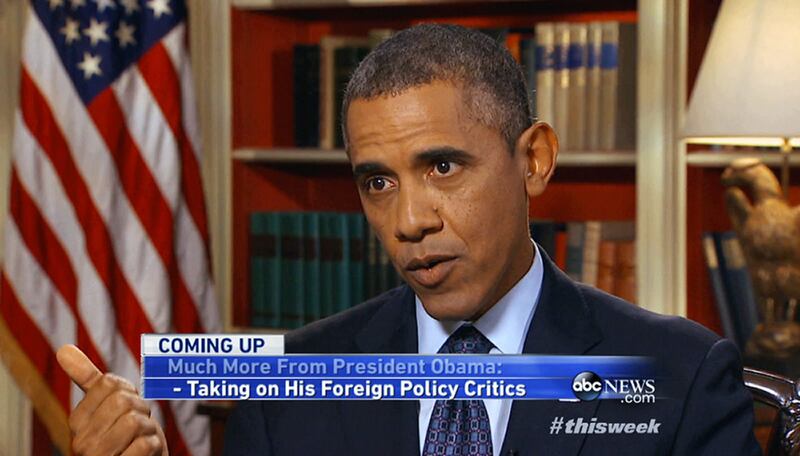The deal to destroy the Assad regime’s chemical weapons stockpile could be a template for nuclear negotiations with Iran, Barack Obama suggested on Sunday.
The US president has exchanged letters with Iran’s president and said he would use his Syria diplomacy, backed up by a military threat, as a possible model for talks with Tehran.
“I think what the Iranians understand is that the nuclear issue is a far larger issue for us than the chemical weapons issue,” Mr Obama said.
He and Hassan Rouhani, the Iranian president, will speak at the UN General Assembly on the same day next week, although there is no plan for them to meet.
Mr Obama said Iran should avoid thinking that the United States would not launch a military strike in response to Tehran’s nuclear programme just because it has not attacked Syria.
“On the other hand, what they should draw from this lesson is that there is the potential of resolving these issues diplomatically,” he said.
Tehran denies seeking nuclear weapons but the UN’s nuclear watchdog has said there is evidence Iran is working towards developing an atomic weapons programme.
Regarded as a relative moderate, Mr Rouhani has made conciliatory statements toward Washington since taking office last month. However, Mr Obama said he doubted Mr Rouhani would make negotiations easy.
“My view is that if you have both a credible threat of force, combined with a rigorous diplomatic effort, that, in fact you can strike a deal,” he said.
Mr Obama spoke a day after Russia and the United States reached an agreement to secure and destroy the Assad regime’s chemical weapons stockpile, averting for now a US military strike.
Israel’s prime minister, Benjamin Netanyahu, cautiously welcomed the US-Russian initiative.
Speaking at a ceremony to mark the 40th anniversary of the 1973 Arab-Israeli war, the Israeli leader called for the “complete destruction” of the poison gas and related munitions and facilities held by Bashar Al Assad’s regime.
“We hope the understandings reached between the United States and Russia regarding the Syrian chemical weapons will yield results,” he said.
Mr Netanyahu also said the agreement would test the resolve of the international community to stop Iran’s drive to build nuclear weapons.
“Here, too, it is not words but actions that will determine the outcome,” he said.
His comments preceded discussions with the US secretary of state, John Kerry, who made a stopover in Jerusalem after brokering the Syria agreement in Geneva on Saturday with Russia’s foreign minister, Sergei Lavrov.
Mr Kerry warned Damascus the “threat of force is real” if it did not commit to the accord, which places a mid-2014 deadline on removing or destroying chemical weapons.
“We cannot have hollow words,” he said.
The US-Russia agreement came in response to US threats of air strikes against regime targets after a poison-gas attack last month near Damascus that the US says killed about 1,400 people.
Under the accord, the Syrian regime has until Saturday to provide a “comprehensive listing” of the types and amounts of its chemical weapons and the locations of sites related to production, storage and research.
During his stopover in Jerusalem, Mr Kerry was also expected to discuss the Israeli-Palestinian peace talks that he succeeded in restarting in July. Under a veil of secrecy, negotiators from both sides have met five times in a process for which Washington has set a nine-month deadline.
But Syria appeared to top his agenda, which sent him to Paris later on Sunday for discussions on the US-Russia deal with the foreign ministers of France, Britain and Saudi Arabia.
Shlomo Brom, a military analyst and retired brigadier general in the Israeli army, described the plan as “almost too good to be true from the point of view of Israel”.
He said the deal potentially wiped out the entirety of Syria’s chemical weapons programme “without one Tomahawk missile fired”.
“What could be better than that?” he said.
Hillel Frisch, research fellow at Begin-Sadat Centre for Strategic Studies, said a US strike on Syria could have accelerated Iran’s nuclear weapons development. The US-Russia plan, he said, would keep Washington’s focus more in line with Israel and its potential for carrying out a military strike against Iranian nuclear facilities.
“I think Israel needs the United States on board against Iran, not against Syria,” he said.
“I think the US being seen as soft on Syria will increase the American political commitment if and when Israel strikes against Iran.”
The Arab League chief, Nabil Elaraby, welcomed the deal as “a step closer to a political solution” to the Syrian conflict, which has killed more than 100,000 people and displaced about seven million others.
The Arab League, which suspended Syria and replaced it with the main opposition coalition, had slammed the Assad regime’s chemical attack as having crossed a “global red line”.
Mr Elaraby called on “all parties of influence to take responsibility through the UN Security Council to ensure a comprehensive ceasefire” and allow access to humanitarian and medical aid.
hnaylor@thenational.ae
mtheodoulou@thenational.ae
* Additional reporting by the Associated Press, Reuters and Agence France-Presse





